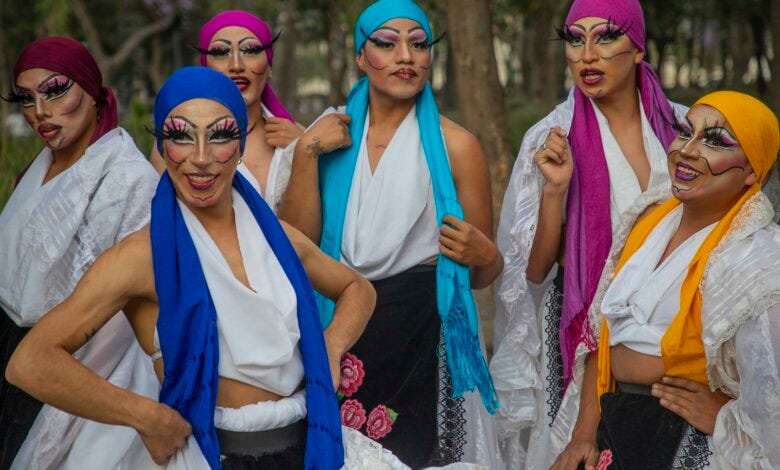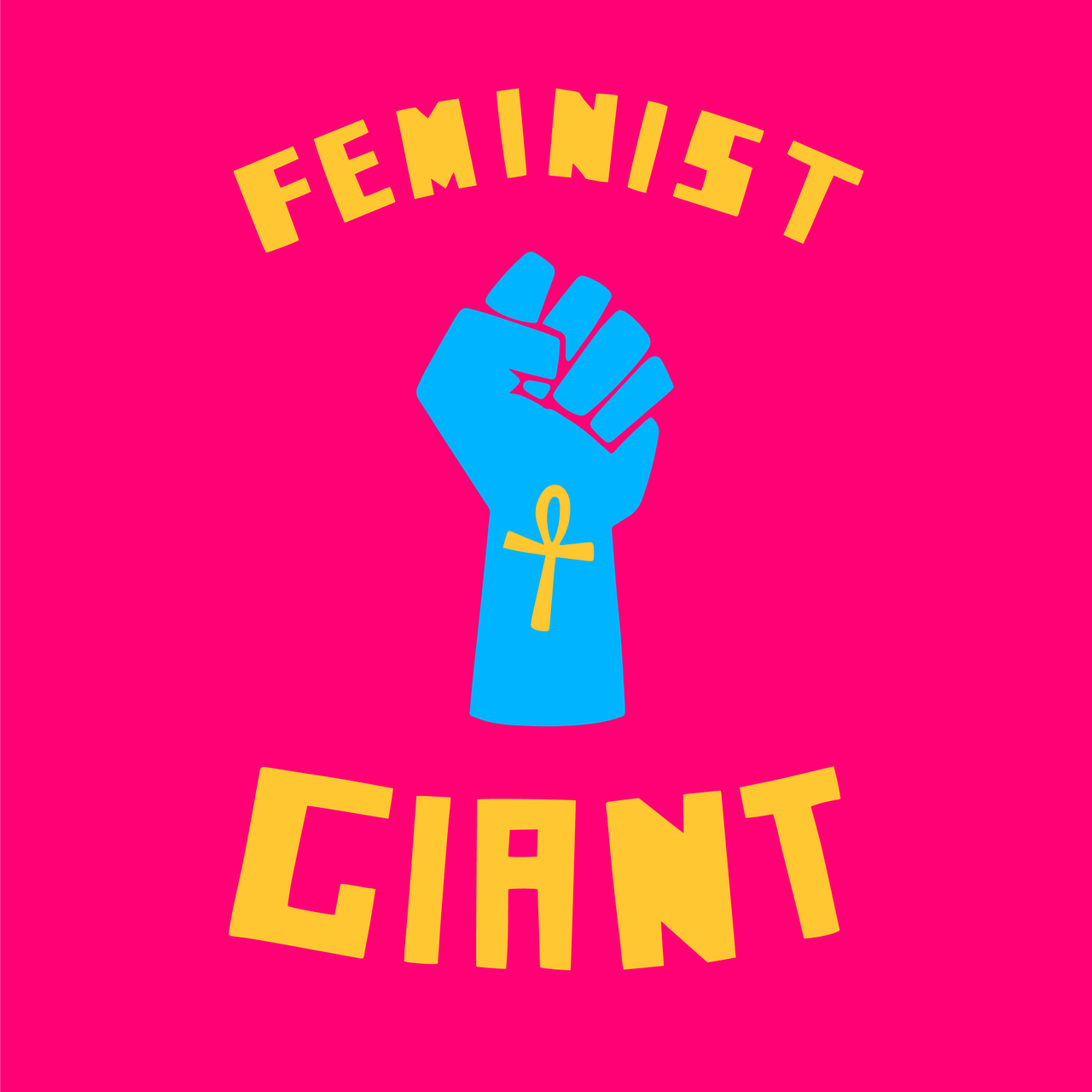Global Roundup: Mexico March Denounces Transphobia, India Trans Artists, 2Spirit Elder on Transgender Day of Visibility, Calls for Hymen Name Change in Taiwan, Refugee Women Empowered by Football Club
Curated by FG contributor Samiha Hossain
Via La Prensa Latina
Dozens of people marched in Mexico earlier this week calling for the end of transphobic hate speech in the country. The march was prompted after several civil organizations and people from the LGBT community claimed that a forum at the National Autonomous University of Mexico included speakers, such as Marcela Lagarde and Amelia Valcarcel, who made transphobic speeches at the event. The “necessary clarifications on sex and gender categories” forum was convened by the Center for Interdisciplinary Research in the Sciences and Humanities (Ceiich).
We condemn the fact that a (university) space has been used to generate a false debate. Did (the university) release any public funds for this forum? (…) If so, the dean has to clarify why it happened. - Gloria Virginia Davenport, trans activist
The demonstrators marched from the iconic Monument to the Revolution to the Benito Juarez Hemicycle in the heart of the capital, Mexico City, where several activists and politicians took the stage to show their support for the trans community and repudiation of what had transpired. After the march and the rally, several groups and artists performed to convey a message of unity and respect for the trans community.
Dozens of people also demonstrated in Ciudad Universitaria, the main university campus, where they made graffiti, chanted slogans such as “here is the trans resistance” and asked the university for explanations and to take measures. In addition, hundreds of groups, organizations, students, professors and university employees signed a statement demanding a strong position against transphobia.
A university associating itself with an event where transphobic speeches took place fuels transphobia. Transphobia is rampant in Mexico, with the country holding the second highest number of violent incidents related to homophobia and transphobia in Latin America, after Brazil. Protesters are demanding accountability from the institution.
Via Forbes India
Hijras, now part of India’s “third gender,” are gender-nonconforming people who are often assigned male at birth. They have an ambivalent position on the edges of Indian society, both respected and feared as some Hindus believe they hold the power to bless or curse. As they are excluded from most jobs and workplaces, many must resort to begging at traffic intersections and on trains. Some turn up at family events such as weddings or birth celebrations, or at new houses, to offer blessings in return for money. Others engage in sex work.
At the latest mural site of Aravani—one of Mumbai's busiest junctions—the team painted portraits of local residents, among them two cleaners, a vegetable seller and a policeman.
It's an opportunity for us to show what talent we have. We have to beg from people by going to marriage functions, babies' births, shops, trains, and some of us are sex workers to make money as well. We go everywhere to beg but we love to work hard and earn money. - Deepa Kachare, trans woman artist
The organization’s projects are commissioned by governments, businesses and NGOs and have brought together dozens of mostly trans women for street art projects in multiple Indian cities. The art collective takes its name from Lord Aravan, a Hindu deity who is "wedded" to hundreds of transgender people every year in a southern Indian festival.
Hinduism has many references to “third genders.” There are millions of gender-nonconforming people in India who identify as hijra or trans and they continue to fight to end discrimination in society.
What's exciting for me is to tell them (transgender artists) that they are capable of doing anything. And gender is really something that should be discussed much, much later and what they do and what they want to do in life comes first. - Sadhna Prasad, Aravani co-founder and artist
Trans artist and member of the group, Ayesha Koli, takes great pride in her pigment-splattered kurta (a long loose-fitting garment worn by South Asians). Koli says that when people ask Aravani members whether they paint when they are wearing their painting clothes, they feel “immensely proud” in saying “yes, we are artists and we paint.”
'[I] believe that one day trans folks will be respected, acknowledged and accepted in society,' says Charlotte Nolin. (Submitted by Charlotte Nolin) via CBC
Charlotte Nolin, a two-spirit Métis elder from Manitoba shares with the CBC her journey of coming to terms with her identity. As a Tastawiniyew (two-spirit) Otipemisiwak (Métis) trans woman, she is a survivor of the Sixties Scoop, where thousands of Indigenous children were taken from their homes and families and placed in foster homes by the Canadian state. Nolin has also survived “Indian day school.” She says that she has experienced racism, homophobia, transphobia and a variety of violence. Nolin also shares her experience as a “former drug addict.”
While in my addiction when I was younger, I suffered at the hands of society and rather than ending up dead, I went back in the closet. During 40 plus years, I lived as my former male self to appease society and its view toward individuals who were born different. - Charlotte Nolin
Nolin discusses her struggles with addiction, relapses and a suicide attempt. In her 40s, she decided to enter the field of social work and devote her life to protecting children and Indigenous families. At that time, she also realized she knew very little about her Indigenous identity.
…I was brought into the world of Indigenous spirituality and soon found myself embedded into the numerous ceremonies and teachings surrounding the spiritual traditions of First Nations peoples. I learned from many wise teachers and today, share these teachings with others. - Charlotte Nolin
Today, Nolin supports young trans folks and two-spirit individuals. She wants young people to know that the ways of society will evolve with time and that there are better days ahead for the trans community.
Yes, there are still the ones who deliberately misgender us in public and the ones who perpetuate violence toward us. But even they are learning that we were here hundreds of years ago and we are still here. - Charlotte Nolin
Nolin is hopeful that “one day trans folks will be respected, acknowledged and accepted in society.”
Via Taiwan News
A women’s organization in Taiwan said earlier this week that the Mandarin term for “hymen” is discriminatory against women, and health authorities should replace it with a proper name. Taiwan Women's Link founder Huang Sue-ying, Taiwan Association of Obstetrics and Gynecology Deputy Secretary-General Lin Tzu-yin, and Democratic Progressive Party Legislator Lin Shu-fen took part in a news conference where the announcement was made.
In Taiwan, the literal translation for hymen in Mandarin is "virginity membrane," and for lochia or postpartum bleeding, "bad excretion." These terms are used everywhere, from locally published dictionaries, medical journals, to academic textbooks.
The term 'virginity membrane' makes a strong association with women's virginity while virginal obsession and the myth of purity persist in society. We should opt for a more neutral wording to avoid the inappropriate association, which unconsciously undermines women's sexual autonomy. - Groups said during the conference
Dr. Wei Shi-lun, Deputy Director-General of the Ministry of Health and Welfare's Health Promotion Administration, expressed her full support for the proposal and emphasized that the ministry will advocate for a more positive and neutral way to describe body parts.
All around the world, the patriarchy views the hymen as proof of women and girls’ virginity and by extension, their so-called purity. This harmful notion is used to shame women and girls and strip them of agency over their sexuality. It also leads to horrific practices such as virginity tests and hymen reconstruction surgeries. Changing the Mandarin word for hymen is certainly a step in the right direction in shifting the misogynistic discourse.
INÈS HACHOU via BBC
Comfort Etim, 38, learned to play football while growing up in Nigeria and after seeking refuge in the UK as a teenager, she now coaches and mentors 30 women refugee players. The club, called Comfort Angels, connects people of multiple nationalities who have fled conflicts, political regimes and persecution. After experiencing a journey through the asylum system, Comfort’s teammates come to her and she is able to refer them to the correct organizations. She says the team is like a family and she is the moral support.
Diversity in football is what makes it a beautiful game. I wanted to create a place for women to express themselves. - Comfort Etim
Hane Leshaj, 33, who plays as a goalkeeper, says the group has helped her "in so many ways" after arriving in the UK.
It was hard in the beginning, especially when you do not speak the language and you have £39 per week to live on. Lots of women like myself had dreams to be footballers, but coming from different backgrounds, they could not. This is to show people who did not believe, that we can do it as well. - Hane Leshaj
Defender and goalkeeper Kate, 37, credits the club for building back her confidence after she had a baby. Mansura, 30, sought asylum in the UK in 2018 and says Comfort's team "fulfills her football passion" and brings relief.
The emotion that comes to mind when playing here is freedom. It helps me mentally and physically and brings renewed joy each time. You can forget your worries that day. My dream is to help create a safe and enabling environment for women and children who are seeking sanctuary. - Kate
Comfort's quest to create a sanctuary for women in her club is being told as part of a documentary. The film's creators, shado, is formed of artists, activists and journalists, whose focus is to bring people together around social justice through storytelling. The co-founder Isabella Pearce believes groups like Comforts’ help create community amid the isolation of asylum seeking.
Samiha Hossain (she/her) is a student at the University of Ottawa. She has experience working with survivors of sexual violence in her community, as well as conducting research on gender-based violence. A lot of her time is spent learning about and critically engaging with intersectional feminism, transformative justice and disability justice.
Samiha firmly believes in the power of connecting with people and listening to their stories to create solidarity and heal as a community. She refuses to let anyone thwart her imagination when it comes to envisioning a radically different future full of care webs, nurturance and collective liberation.







